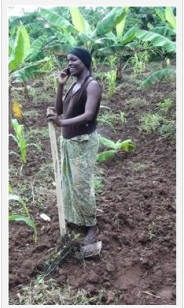Remote, mountainous, and hard-to-reach areas like Uganda’s Kabale district suffer from inadequate access to information of all kinds. Because the region, located in the southwestern corner of Uganda, is predominantly agricultural, timely and relevant information for farmers in Kabale would significantly help improve their livelihoods.

A mobile phone application developed by the project Life Long Learning for Farmers in Uganda (L3F Uganda) is helping Kabale farmers get the information they need. The project sends text messages with agricultural updates and information to about 1,000 farmers. This information, disseminated twice weekly by L3F Uganda, has helped farmers get valuable guidance on market access, fertilizer application, plant spacing, timely planting, local diseases, and other topics. The project is a partnership of Commonwealth of Learning, Makerere University’s Agricultural Research Institute Kabanyolo, and local community organizations, and was instituted as a pilot project in Bufundi, a sub-county of Kabale, in 2009 with the hope of extending it to all of Uganda.
The main aim of L3F Uganda is to help solve the many challenges farmers confront in the region. These include inadequate road networks, preventing farmers from getting to markets; a lack of credit and financial services; volatile market prices; and a lack of up-to-date information about seeds, weather patterns, appropriate fertilizers, pests, and other agricultural issues. Traditionally, the government’s agricultural extension service was the main source of information for farmers in Uganda, but the current ratio of extension workers to farmers in the country is 1:24,000, rendering the service largely ineffective. In Bufundi, the ratio is 1:46,000.
Another major challenge in the Kabale district is low literacy rates, especially among rural farmers. According to the Uganda Bureau of Statistics, less than half of adults in Kabale were literate in 2000, and more than three-quarters of the adult population didn’t advance beyond the primary level of education. Because this low literacy rate makes written information useless to many farmers, L3F Uganda has created a voice application for its mobile-phone information service. The recordings are spoken in Rukiga, the local language, and features actual farmers from the region, says Daniel Ninsiima, the creator of the application. “We have used voices from successful farmers around the sub-county because fellow farmers can easily relate to them when they hear them on the other end,” Ninsiima explains.
Because more than 75 percent of farmers in the project’s pilot area own mobile phones, text- and voice-messaging provides an effective grassroots replacement of the government’s agricultural extension service.
The L3F project faces additional challenges, including poor mobile-phone network coverage in remote areas, and the farmers have to pay for the cost of the calls and texts. But L3F Uganda researchers hope to coordinate with telephone companies to subsidize and improve service in these agricultural districts. L3F Uganda has also trained farmers how to bargain and market their produce collectively, as well as helped start a savings and credit cooperative, giving them a local source of funding. The project has also created self-help groups for local farmers, which have instigated conservation efforts to reduce soil erosion and depletion on the area’s steep slopes. And with the help of Commonwealth of Learning the groups have also written a training manual for farmers in the local Rukiga language.
Because L3F Uganda adapts its educational tools to fit farmers’ lifestyles and technological capacities, rather than imposing costly or time-intensive educational programs on farmers, the project can make real advances in empowering farmers and improving their livelihoods.
By Laura Reynolds

Danielle Nierenberg, an expert on livestock and sustainability, currently serves as Project Director of State of World 2011 for the Worldwatch Institute, a Washington, DC-based environmental think tank. Her knowledge of factory farming and its global spread and sustainable agriculture has been cited widely in the New York Times Magazine, the International Herald Tribune, the Washington Post, and
other publications.
Danielle worked for two years as a Peace Corps volunteer in the Dominican Republic. She is currently traveling across Africa looking at innovations that are working to alleviate hunger and poverty and blogging everyday at Worldwatch Institute’s Nourishing the Planet. She has a regular column with the Mail & Guardian, the Kansas City Star, and the Huffington Post and her writing was been featured in newspapers across Africa including the Cape Town Argus, the Zambia Daily Mail, Coast Week (Kenya), and other African publications. She holds an M.S. in agriculture, food, and environment from Tufts University and a B.A. in environmental policy from Monmouth College.








